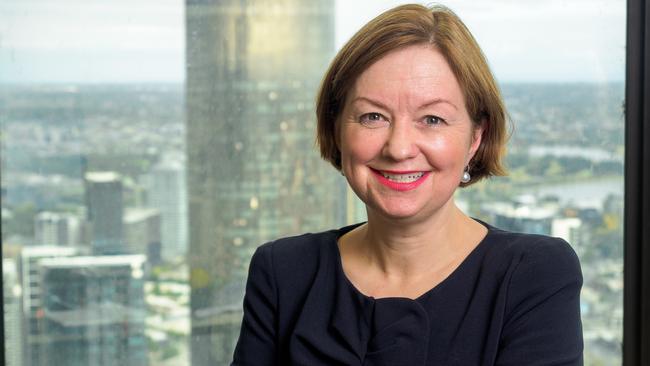Secrets of a successful CEO revealed in new research by Russell Reynolds Associates
New research examines the personal attributes that distinguish successful CEOs in the current difficult environment of rising inflation, supply chain challenges and market volatility.

Australia’s top company chairmen want their chief executives to have the courage to stay open to new ideas, the humility to admit they don’t have all the answers and a willingness to channel their emotions to drive good decision-making during the current period of economic and geopolitical volatility, according to one of the nation’s top headhunters.
Russell Reynolds Associates managing director Anita Wingrove, who has more than 20 years of business and advisory experience across the Asia-Pacific region, said the global executive search giant was currently finalising a landmark piece of research on CEO decision-making during tough times, following interviews with 20 of the nation’s top male and female chairmen.
The study, titled “How CEOs make complex decisions”, examines the personal attributes that distinguish successful CEOs in the current difficult environment of rising inflation and interest rates, supply chain challenges, sharemarket volatility and geopolitical uncertainty.
It was conducted by asking each chairman to give feedback on a single, successful CEO with whom they had worked closely. All of the companies were listed aside from some in the healthcare sector that were owned by private equity groups.
“It is about this idea of being able to bring the right voices into the room and think through the complexity of leadership, being able to remain humble in your own voice while holding your ground when you need to,’’ Ms Wingrove said of the findings, that will be released in coming weeks.
“Then when you are under pressure, how do you use emotions as data to think through complex decisions rather than letting them lead to the wrong decision-making processes and outcomes.”
As a registered psychologist, Ms Wingrove is an expert on behaviours that drive success at all levels of business.
She has long been a commentator on the psychology of successful business leaders, organisational culture and cultural alignment.
She said decision-making was an underestimated area when looking at CEO effectiveness and performance in difficult periods, especially now when boards had been “doubling down” on scenario planning because of the complexity and uncertainty of the current corporate world. “We wanted to put the microscope on what really makes good decision-making, to get to the essence of the process, particularly in this multi-stakeholder environment,” she said.
The past year has been a good period for search firms as corporations have emerged from two years of Covid-19, when many companies and boards opted to keep their CEOs, chairs and non-executive directors in place for the sake of stability.
“The data speaks to the fact there was a hiatus period and there has been catch-up. We have seen that in the past 12 months with how busy we have been and how busy the market has been. I’d imagine that will taper off a little bit. But there will still be pressure and movement because we have a talent shortage,” she said.

With increasing turnover in the C-suite and examples over the past year of CEOs who have exited their jobs prematurely due to burnout, bad fit, poor behaviour or other factors, it’s important to have the right CEO in place.
Ms Wingrove said that despite the external challenges, the pace had not slowed on CEO succession planning as boards continue to look to hire internally.
She said a paradox was emerging: while the gap in the breadth of the responsibilities between being in the C-Suite and being a CEO was now bigger than ever, the areas CEOs could directly control had shrunk.
“Experience and capability is key. By the time a leader is at C-Suite level, they have the potential to be a CEO … Boards need to ask what are the critical experiences they need that are going to differentiate success for them and how do you provide that experience productively,” she said.
“The few topics we see as being critical are not shying away from operational experience, especially moving into a more risky and complex environment. Then there is the breadth of experience that overlays that – have they been a CTO (chief technology officer), had exposure to a breadth of thinking across the enterprise and have they engaged in disruption?”
Executive recruiter Ben Derwent, the founder of Derwent, claimed earlier this year that charting the best path to net zero emissions by 2050 and balancing the short-term demands of investors, suppliers and staff for “quick wins” on climate change policies would be one of the most pressing issues for boards in 2022.
Ms Wingrove said leaders could be more ESG-minded by engaging in more systemic thinking and listening to drive change.
“There are still a good number of leaders globally who follow an ESG mindset because they have to,’’ she said. “As soon as you move right or left or take a position on something, you are immediately putting a stakeholder group off-side. So when you see organisations, for example, take positions on the Russia-Ukraine war, there has been unintended consequences for some, not just here but globally. This interconnected nature of stakeholders and much stronger voices around a single issue has changed in recent years. That makes the path much more complex to navigate. You also have the advent of social media.”
Companies seen as leaders in environmental and social policies are not only attractive for investors but they are being increasingly seen by employees as more desirable places to work during a period of labour shortages, especially in the professional services sectors. At the same time employees are far quicker to call out executive styles considered overbearing or intimidating, described by recruiters as drawing from a now old-fashioned and outdated “command and control” playbook.
Ms Wingrove said a concern about losing talent ranked with geopolitical uncertainty at the top of the issues currently worrying CEOs. She said there had been a flight of talent to the technology and private equity sectors.
“In some sectors the salaries being offered are really quite ridiculous. People are being promoted by leaving organisations, so companies need to think more about internal promotions. If the market thinks they are ready for promotion and you don’t, you have a problem,” she said.
“This is heightened by the reduction in talent coming into Australia from internationally.”
The tight labour market for certain professional jobs is also making employers wary of being too dictatorial about getting staff back into the office full-time in the post-Covid world of remote working.
“The organisations that are doing it well are being very consultative. They are looking at what working in an office offers an employee. They have readjusted the proposition for going into the office. So if I come into the office, I am contributing to something bigger than me,” Ms Wingrove said.
“Managers want to connect people back to a higher purpose.”








To join the conversation, please log in. Don't have an account? Register
Join the conversation, you are commenting as Logout